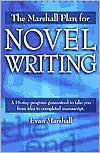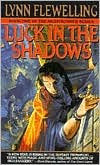Tuesday, April 21, 2009
The Marshall Plan 1: It's Better to Have a Plan
I read literally every single review on Amazon of The Marshall Plan for Novel Writing, by Evan Marshall. I wanted to understand how others see the book and the plan that it offers. Most reviews were very positive. A smaller number of them were critical. The primary issue in the critical reviews was the belief that you shouldn't plan a novel using a template. Novels are unique, and each must be written according to its own dictates. By using a standard template to map out sections and sequence various scenes based on point-of-view characters, you would either end up with garbage or a manuscript that was so superficial that readers would never buy into it. The idea that the "art" that is novel-writing could be reduced to a formula was patently offensive to some reviewers.
I'm not one of them. I think the plan is great.
Many aspiring writers complain they can't work from a plan because it constrains them. They need to let the story flow, and follow it wherever it takes them. When they try to map things out and then follow their notes, or outlines, they feel hemmed in. I used to feel that way, too, until I realized that the plan, the outline I was attempting to follow, was not imposed on me from without. It was my plan. I had created it. The notes, outlines, etc., were just a written reminder of the ideas I had come up with, the very same ideas I had decided I wanted to write about.
When I realized this, and kept writing, I found my resistance to following a plan slipping away. In its place came a satisfying sense of calm. I was able to write with a sense of assurance that I knew what I was writing and where it was taking me. I could still change things along the way, but at least I knew the story and was less apt to get lost. Any changes were either minor details, the scenery along the way, or if they were truly significant story changes, then I could stop, revisit the plan, and understand what other things needed changing in order to accommodate the new inspiration.
Planning saves time in the long run. A month spent thinking about your story, brainstorming, writing notes, developing a basic plot outline, and then fleshing out individual scenes (or sections, as we shall see), is time well spent. Once you know your story, you can focus on telling it, rather than bearing the burden of creating your story at the same time you're trying to write it.
There will always be those who prefer not to plan, but I no longer feel sorry for them when I hear how they struggle, going in circles, writing chapters only to toss them once they realize they don't fit into the ever-evolving story. I no longer pity writers who complain they don't know where their story is headed, or what to write next. I deal with those same questions, of course, but I hit them head-on up front and answer them before I begin writing. I know where I'm headed, where the story is headed, where each character is headed. And, having a detailed plan means each scene is focused. It means you can focus on telling it in the most effective manner, rather than trying to figure out who the point-of-view character is, or what his/her goal really is, etc., while writing.
So, my first point in my in-depth review of The Marshall Plan, and the new software based on it, is that having a plan is a good thing. A template that can help you shape your ideas into a workable plan is a valuable tool. It will save you from poking around in the dark trying to find your own way. It will save you time, allowing you to focus on getting your story written. It will reduce the frustration and increase the tangible progress.
Furthermore, Evan Marshall, a professional editor, surveyed best-selling novels and well-written, successful fiction when he developed the plan. If you conduct your own survey, you will find that the advice he gives is followed by best-selling authors. They may or may not have read his book, but they are adhering to the same key ideas about plot and style.
And the cookie-cutter criticism? I don't share it. The template is a starting point. It provides a solid, basic, generic plan that works. If you haven't yet produced a commercially-viable novel, then you should take a good look at a plan that works. You can try it out, learn from it, improve your skills, and once you have the template down, you can change it as needed to reflect the particular needs of a given story. But before breaking the rules, it's good to learn the rules, the same rules that successful novelists follow. This plan can help you do that.
Adrian
Thursday, April 09, 2009
INTERESTING NEWS!
Recently, I received an email from one of my heroes, Evan Marshall. You probably recognize his name (you should!). He wrote THE MARSHALL PLAN FOR NOVEL WRITING, which you can find on Amazon and elsewhere. It is the one book of advice for writers that, in my humble opinion, stands above all others, because it offers truly practical advice, the sort of nuts and bolts stuff that you really need to know. I mean, the stuff you REALLY NEED TO KNOW. For more details on the book, check it out on Amazon. If you'd like to read an interview with Evan Marshall, there is one at Absolute Write.
If you're wondering why the "guru of novel writing" (see interview at Absolute Write) would send moi an email, here's the reason: for the past three years. Evan, along with coauthor Martha Jewett, was working on a software program to accompany his book. The software is a novel-writing program which follows the Marshall Plan. It is designed to help you plan your novel by breaking your story down into sections, and pointing the way as you juggle multiple plot lines. You don't need the software to use the Marshall Plan -- the plan is outlined in the book, and there is also a Workbook available to help you further (as well as a book on Getting Your Novel Published). Nonetheless, the software is very helpful in laying out the templates for you--it fully automates this process. The templates are the forms you fill in to describe what happens in each section (or scene) in your story. If you have read the book without quite grasping what the plotting system was all about, the software will lay it out for you and make it absolutely clear exactly how the Marshall Plan works.
You can find a detailed description of the software on Evan Marshall's site.
Evan offered to send me a free copy of the software so I could review it. That was certainly very generous of him. I emailed him back that I would be happy to review it, and might even test out the software and blog about it here, so my readers can learn more about it and its potential usefulness.
When I first received the software, it took me seconds to install it, about ten minutes to get the basic sense of it, and within twenty minutes I had already started plotting a novel with it. Note that I accomplished this without reading any instructions! The software is intuitive, if you are familiar with the Marshall Plan.
The past few weeks I've been working with the software, and I reread the book to make sure I'm up on the concepts and excellent advice of the Marshall Plan. I'll start sharing that experience now, using the next several blog postings to tell you about the software and the Marshall Plan and how they have helped me -- and they have!
So, look forward to some enthusiasm (I've got lots after the experiences of the past few weeks), some helpful advice (the Marshall Plan is full of it), and some rather impressive results (I've been amazed at what I've accomplished).
Until soon,
Adrian
Subscribe to:
Comments (Atom)







